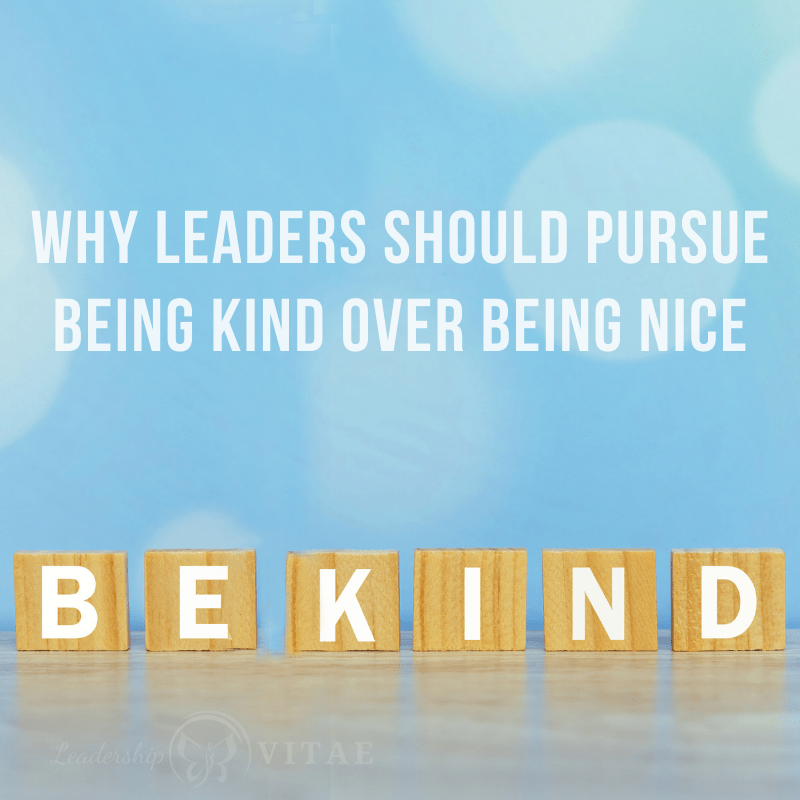
I was spending time with a good friend of mine recently. She was saying hi to all the neighbors as we walked by, always with a smile and a word or two (or ten). She’d be someone I’d tell people “she’s so nice” and I pointed out that no one would lead off saying that about me.
She was super offended. As my friend, of course she thinks I’m nice. It’s not that I’m a mean or bad person, and I can be nice. But nice is not the first thing someone might say. Passionate or energetic probably, but not nice.
And nice is not what I lead with.
I think of nice as polite and socially gracious. It’s a way people have of making others comfortable in their presence. The quick smile and unoffending conversation.
Others may be able to genuinely show up that way and mean it to their core. But that’s not what I want from others, and not how I show up.
Nice vs kind
I’ve always been direct. Recently, I came upon some letters my mother wrote my grandparents when I was young. In one, she wrote “the way Kristin said it was a little strange. I hope you understand it came from a place of love.”
I think I’ve spent my entire life feeling that way. That the words I use are sometimes misunderstood, or taken poorly because I wasn’t nice. I said the thing I thought was true, thoughtful, or necessary in that situation. It may not have been nice, but it was always in service or caring for the other person.
That’s kind. Not nice, but kind.
When we’re kind, we think of what would benefit the other person. It might be hard to hear – and perceived as “not nice”. However, it may be a message that can benefit them more than something pleasant that’s easier to hear.
The double whammy
As women, there is an expectation that we are nice. In the south, it’s even more so. It’s considered perfectly okay to be polite in person, and then express our true thoughts elsewhere.
That’s not nice or kind in my opinion.
In a mid-term review with one of my people, I was providing some input that I thought he needed to hear. I was careful in how I presented it – saying that it was to prepare him for the future vs a critique of how he shows up.
His response surprised me. He said “I know how you mean it and I’m taking it that way. Every bit of feedback you’ve ever given is to help me and because you care. I may have misunderstood you in the beginning, but now I know your only intention is to help.”
Often, we say we want someone to tell us the truth and be direct, but it can be uncomfortable. We can be critical of others that push against our comfort level and perceive them as “not nice.”
Instead, we should be celebrating the effort it takes to push against the pressure to be nice. We should celebrate hard truths as someone being kind, and wanting to help us grow and improve.
The threat of kindness
Unfortunately, it can be even more difficult for leaders to be perceived as kind, especially now.
At this time in history, we are all living and leading in an unprecedented level of threat state. This has lasted longer than most natural disasters, and we are just now seeing the promise of getting to some level of new normal.
We have used up our reserves to be able to manage this level of stress. We’ve normalized it, because being in fight/flight/freeze non-stop would wear our hearts out. But if we scratch the surface even a little bit, we might be quick to react, judge, or blame.
During any heightened threat state, which can occur with any prolonged and significant change (organizational, home, or world), the gap between us grows. The gap we need to bridge to be given trust, the benefit of the doubt, or a leap of faith. We also look for someone to blame, and that is often our leader.
For leaders, that means seeing feedback as kindness is even less likely during threat state. Whether there is a global epidemic, an organizational change, or even critical input on performance.
It would be tempting to be nice. To avoid difficult conversations. Instead, we need to be aware of the threat and step towards our people to help bridge the gap.
Mind the gap
We have little to no trust with new relationships and teams. It’s clear trust needs to be built with new connections.
However, any trust we have with our people, even our friends and family, can disappear or be forgotten in threat state. An invisible gap is created that we have to intentionally lessen if we want to be well-received.
Thinking back to the mid-year review, what if there was a current performance concern? I might have had to remind my person that I am sharing feedback because I care and I’m here to help. That I have every confidence in his or her ability to deliver, and want to provide tools or input to help ensure their success.
It still might be difficult to hear. And we can acknowledge that. “This may be difficult for you to hear. But I think it would be more difficult if I didn’t tell you. I trust you to do your job, and you need to trust that I won’t see something that could derail you and just let it happen.”
Demonstrating awareness of the difficulty, and reminding someone that our words come from a place of service to them, can help bridge the trust gap in new relationships or during threat state.
Commitment to kindness
Another change is on my horizon. Looking back on the last few years , living in the south and working with my current company have taught me a lot. As a change leader, learning about threat state and the trust gap have been truly transformative.
One of the lessons I could have learned was to reject kindness and pursue being nice. As a woman in the south, it probably would have been easier and faster to get along.
I’ve spent a lifetime feeling that my good intentions went unseen. Now I know that my teams, friends, and family were likely in threat state or otherwise unable to receive my intended kindness.
Rather than perceive that it’s easier to be nice, I now have the tools to help my kindness be received and valued. I likely will never have anyone lead off saying “she’s so nice,” but hopefully one day they will say “she’s so kind.”








